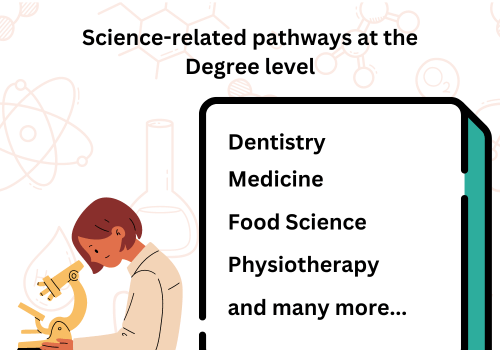
Do you have a strong interest in science-related subjects such as biology, chemistry, and physics? Are you currently seeking opportunities for higher education in these fields?
This is your chance to further your studies with a Foundation in Science program in Malaysia. Many universities in Malaysia offer this program, which combines theoretical and practical learning sessions to develop important soft skills.
If you're interested in learning more about Foundation in Science programs in Malaysia, let's explore this guide as it provides essential information that you need to know about studying the course.
What will you study in Foundation in Science?
When you pursue higher education in this field, you will learn not only science subjects but also Mathematics and several other foundational subjects.
This is because the structure of the foundation level learning aims to provide students with essential knowledge and practical skills required at the university level.
Therefore, it is important for you to learn the subjects outlined by the university, such as Chemistry, Biology, and Mathematics.
Furthermore, you have the opportunity to choose a specialized pathway to focus on, such as Pure Science and Engineering Science, during your foundation studies.
Each pathway has specific subjects that need to be studied and differs from the other ones. This will help you develop a keen interest in your chosen branch of science for your Bachelor's degree.
The knowledge you gain at this foundation level will serve as a solid base for your future studies at the degree level. So, give your best during the foundation program and make sure you understand the teachings of your lecturers.
How long is the duration of the program?
Typically, this pre-university program lasts for one year and is offered on a full-time basis.
What are the requirements to pursue this course?
- SPM: Pass with minimum of 5 credits including Mathematics and 2 Science subjects
- O-Level: Pass with minimum of 5 credits including Mathematics and 2 Science subjects
- Unified Examination Certificate (UEC): Minimum grade B in 3 subjects including Mathematics and 2 Science subjects
- And other equivalent qualifications recognized by the Malaysian government
Where can you study this course?
3. INTI International College Subang
5. UniKL
Universities in Malaysia
-

University of Cyberjaya (UoC)
FeaturedMalaysia
-

Asia School of Business (ASB)
FeaturedWP Kuala Lumpur, Malaysia
-

Selangor, Malaysia
-

SEGi University Kota Damansara
FeaturedSelangor, Malaysia
-

Sunway University
FeaturedSelangor, Malaysia
-

Malaysia
-

Malaysia
-

Sunway College
FeaturedSelangor, Malaysia
-

WP Kuala Lumpur, Malaysia
-

Johor, Malaysia
See more related universities
What core subjects will you learn in this course?
As mentioned previously, you have the option to select a specialized pathway for this course at the Degree level. However, during the foundation studies, you will learn these core subjects to enhance your foundational understanding:
- English for Academic Purposes
- Critical Thinking/ Creative Thinking skills
- Chemistry I and II
- Mathematics
What pathways are available after completing this foundation study?
After successfully completing a Foundation in Science program, you will have various science-related pathways to pursue at the Bachelor’s Degree level, such as:
- Dentistry
- Medicine
- Pharmacy
- Nursing
- Food Science
- Physiotherapy
- Biomedical Sciences
- Hospital Management
- Engineering,
- and many more.
Advantages of studying Foundation in Science in Malaysia
Studying a Foundation in Science in Malaysia offers several advantages, such as:
1. Smooth transition to degree programs
Foundation in Science programs in Malaysia offer a smooth transition to various science-related degree programs. These programs are designed to provide students with a comprehensive understanding of core scientific principles, mathematics, and other essential subjects.
One of the key advantages is the solid academic foundation they provide for further studies. After completing this program, students are well-prepared to pursue Bachelor’s Degree level studies in various science-related fields.
The rigorous curriculum of Foundation in Science programs ensures that they acquire the necessary knowledge and skills to excel in their chosen fields. Whether it's biology, chemistry, physics, or mathematics, students gain a strong theoretical
understanding as well as practical skills through laboratory work and hands-on experiments.
Moreover, Foundation in Science program often includes modules that focus on critical thinking, problem-solving, and communication skills, which are essential for success in higher education and workplace.
By offering a diverse range of subjects and specialized pathways, this program caters to the individual interests and career goals of students. This flexibility allows students to explore different disciplines within the field of science and make informed decisions about their academic and career paths.
2. Development of critical thinking skills
Studying this program does not only impart academic knowledge; it also emphasizes the development of critical thinking, problem-solving, and practical skills. Through hands-on learning experiences, such as laboratory work and research projects, you will gain a deeper understanding of scientific concepts and principles.
These programs encourage you to think analytically and explore solutions independently. By engaging in scientific inquiry and experimentation, you develop the skills needed to tackle real-world challenges in your future academic and professional endeavors.
Furthermore, the emphasis on practical skills ensures that you are well-prepared for the demands of higher education and the workforce. Whether it's conducting experiments, analyzing data, or presenting findings, you will acquire the essential skills to succeed in your chosen field of study.
3. Wide range of specializations
Malaysia's Foundation in Science programs offer you the opportunity to explore a wide range of science-related disciplines, including biology, chemistry, physics, and mathematics.
This exposure allows you to gain a broad understanding of the different branches of science and discover your areas of interest. By exploring various disciplines, you can make informed decisions about your future academic and career paths.
This flexibility ensures that you can tailor your education to suit your interests and career aspirations.
Whether you choose to pursue further studies in academia or a career in research, industry, or healthcare, a Foundation in Science program provides you with a solid academic foundation and the necessary skills to succeed in their chosen field.
What must you consider before taking this course?
Deciding whether to pursue a Foundation in Science program requires careful consideration of an individual’s skills, abilities, and aspirations. While these programs offer a solid academic foundation and numerous benefits, they may not be suitable for everyone.
Several factors should be weighed so that you can make an informed decision about this:.
1. Interest in scientific subjects
Before studying the Foundation in Science program, you should evaluate your proficiency and passion for scientific disciplines. Success in these programs often depends on a strong foundation in mathematics and the sciences, as well as critical thinking and problem-solving skills.
If you have a genuine interest in scientific inquiry and excel in these areas, you are likely to thrive in a Foundation in Science program.
2. Long-term academic and career goals
Given the variety of learning branches and career paths available in science-related programs, it is essential to choose a pathway that aligns with your interests, understanding and strengths.
Also, keep in mind that science-related programs tend to be more expensive than other courses, so take your time and make a well-considered decision.
3. Learning preferences and academic readiness
When considering a Foundation in Science program, it is important to note that each student has unique learning preferences and varying levels of academic readiness.
These programs can be academically demanding, requiring dedication, strong self-discipline, and effective time management skills. Science programs are known for their challenging nature.
If you find certain subjects difficult to understand, it's essential for you to take proactive steps such as forming study groups with classmates or dedicating extra time to self-revision. Identify your weaknesses during self-revision and adjust your study schedule and habits accordingly to ensure a thorough understanding of the material.
 +60142521561
+60142521561







